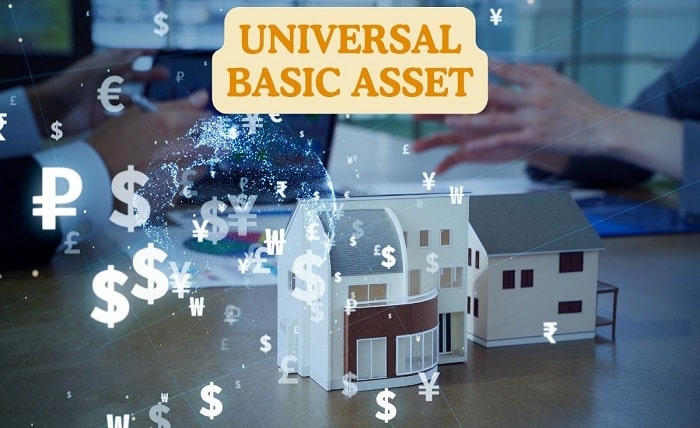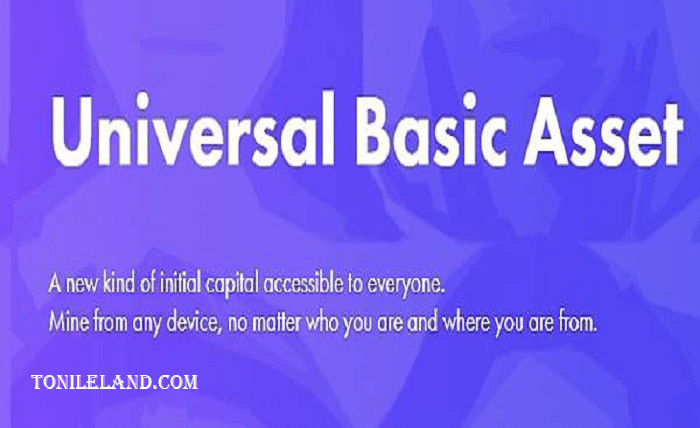Exploring the Universal Basic Asset (UBA) and Its Potential

The idea of a universal basic asset, or UBA, has received a lot of attention lately, particularly in the aftermath of the COVID-19 epidemic and the rise of global inequality and insecurity. Every person will receive a monthly, unconditional cash payment under the UBI programme, regardless of their job status, income, or other circumstances. The goal is to lessen poverty and social isolation by guaranteeing that everyone has a minimal amount of money to cover their fundamental requirements.
UBI is not without its detractors and difficulties, though. Some contend that universal basic income (UBI) discourages effort, creativity, and social contribution and is too costly, inefficient, or unjust. Some argue that universal basic income (UBI) fails to address the underlying causes of inequality and injustice, which include the concentration of power and money in the hands of a small number of people, the exploitation of labor and natural resources, and the lack of access to opportunities, health care, and education.
A universal basic asset (UBA) can help in this situation. UBA is an alternate or complementary strategy to UBI that emphasizes the distribution of assets above income. Resources including land, housing, infrastructure, technology, knowledge, culture, and social capital are examples of assets, as they are the sources of prosperity and income. The goal of UBA is to guarantee that all individuals have an equitable and fair portion of these resources, enabling them to generate value and engage in the economy and society. We shall discuss the idea of UBA, its advantages and disadvantages, and some real-world applications.
Universal Basic Asset: What Is It?
The Institute for the Future (IFTF), a nonprofit that researches the future of labour and society, is credited for coining the word “UBA.” “A framework for ensuring universal and equitable access to a set of resources that are essential for human well-being and prosperity” is how the IFTF defines UBA. The foundation of UBA is the idea that all people have a right to the commons, which are the resources that we all share and depend on for existence and prosperity.
Instead of being a one-size-fits-all strategy, UBA is a framework that is adaptable to various demands and circumstances based on context. UBA may comprise a variety of assets, including:
Natural assets are the environmental resources—land, water, air, biodiversity, and ecosystems—that support life as we know it on Earth. For the benefit of both current and future generations, UBA can guarantee that everyone has access to clean, healthy natural resources and that they are managed fairly and sustainably.
Physical assets: These are the tangible resources—housing, transportation, energy, and technology, for example—that make production and consumption possible. UBA can guarantee that physical assets are accessible to everybody, are reasonably priced and sufficient, and are dispersed equally and effectively among the populace.
Digital assets: These include data, software, platforms, networks, algorithms, and other information and communication resources that support learning and innovation. UBA can guarantee that digital assets are developed and administered democratically and openly for the sake of the public good, and that everyone has access to them.
Social assets: These include the cultural and social resources—such as identity, community, norms, and values—that facilitate collaboration and involvement. UBA can guarantee that everyone has access to a wide range of inclusive social resources and that their well-being and social cohesiveness are valued and promoted.

Why Is Universal Basic Asset Required?
UBA is a reaction to the potential and problems of the twenty-first century, including:
The emergence of automation and artificial intelligence: these technologies are changing the nature of work and what it will look like in the future. They are opening up new avenues for creativity and productivity, but they are also uprooting and upending a large number of occupations and businesses. By giving individuals the tools and abilities they need to take advantage of new possibilities and provide value in the digital economy, UBA can assist people in adjusting to these changes.
The rise in insecurity and inequality: The current economic system is typified by low income and opportunity for the majority and a huge concentration of wealth and power in the hands of a small number of people. UBA can assist individuals in overcoming these obstacles by giving them the resources and agency required to raise their level of life and take part in political and economic decision-making.
The risk posed by environmental deterioration and climate change: High resource consumption and a disregard for externalities and their effects on the environment are further traits of the present economic system. By giving individuals the resources and incentives they need to lessen their ecological footprint and to preserve and restore natural resources, UBA can assist people in making the transition to a more resilient and sustainable system.
What Advantages Does Universal Basic Asset Offer?
UBA may help people and society in a number of ways, including:
Improving well-being and reducing poverty: UBA can give individuals access to the necessities of life, including food, water, housing, healthcare, and education. By raising people’s happiness, contentment, and quality of life, UBA can also benefit their general well-being.
Increasing justice and equality: UBA can give everyone, regardless of background, position, or location, the fair and equitable portion of the resources they are entitled to. By addressing the systemic, historical, and discriminatory injustices and prejudice that have robbed many people of their legitimate possessions, UBA may likewise advance justice.
Encouraging creativity and innovation: UBA can provide people the chance and means to make use of their abilities, skills, and capabilities. Because UBA encourages experimentation, teamwork, and the co-creation of new ideas and solutions, it may also foster innovation and creativity.
Increasing democratic involvement and power: UBA may allow individuals the ability to design and affect their institutions, policies, and assets. By giving individuals the ability to participate, organise, and mobilise for the common good, UBA may help increase democracy and participation.
What problems does the Universal Basic Asset Face?
UBA is not a panacea; among its numerous difficulties and restrictions are the following:
UBA necessitates a precise and uniform description and measurement of assets, as well as an understanding of their quantity and availability. This is a difficult undertaking since different assets have unique traits, values, and trade-offs that might change based on the situation and viewpoint.
Finance and asset distribution: UBA needs a reliable, sustainable source of finance as well as an equitable and effective asset distribution system. This is not a simple task since various assets have varying costs, advantages, and effects. They may also call for various taxes, allocations, and regulatory strategies.
Asset management and governance: UBA calls for a system of asset management and governance that is open, accountable, and strikes a balance between the rights and obligations of the many stakeholders. This is not an easy task since various assets have unique dynamics, conflicts, and interests. They may also call for varying degrees of involvement, representation, and supervision.
How Can Universal Basic Assets Be Put into Practice?
UBA is a realistic, workable concept that can be applied on many levels and in many contexts, from the local to the global, rather than a theoretical or utopian one. Here are a few instances of practical UBA realisations:
Land trusts are nonprofit institutions that purchase and oversee property for the community’s advantage, such as to promote regional agriculture, maintain open space, or provide affordable housing. Land trusts may guarantee equitable and sustainable use of natural resources while also ensuring that everyone has access to them.
Platform cooperatives: These are internet-based businesses that provide digital services, goods, or content and are owned and managed by their employees, clients, or users. Platform cooperatives may guarantee that social and digital assets are generated and managed in an open, democratic manner and that everyone has access to them.
State-owned investment funds known as “sovereign wealth funds” are tasked with amassing and overseeing public monies, which may come from natural resources, taxes, or dividends. A fair distribution and prudent investment of the nation’s assets, together with a share for each citizen, may be guaranteed via sovereign wealth funds.
Conclusion
A new paradigm for economic justice known as “universal basic assets” seeks to guarantee that all people have equitable access to the resources necessary for human success and well-being. In contrast to universal basic income, universal basic income (UBA) emphasises the allocation of assets rather than income. UBA may help people and society in many ways, including by lowering poverty, promoting equality, encouraging creativity, and bolstering democracy.
FAQs:
- Who would benefit most from a UBA? Individuals facing economic hardship, marginalised communities, and those disadvantaged by automation could see significant benefits.
- How would a UBA be funded? Various funding models exist, including taxation on wealth, natural resources, or financial transactions.
- Would a UBA replace existing social programmes? The UBA could potentially complement or integrate with existing programmes, requiring careful design and transition strategies.
- Could a UBA incentivize laziness? Research on UBI suggests a minimal impact on work motivation, and the UBA’s diverse assets could even encourage entrepreneurial pursuits.
- What are the next steps for the UBA? Pilot projects, simulations, and public discussions are crucial to exploring the UBA’s feasibility and potential impact before widespread implementation.




